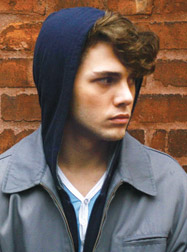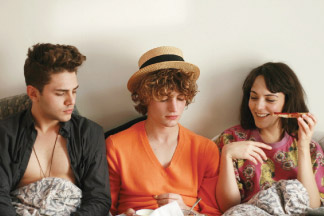 |
|
Xavier
Dolan |
The brutal honesty of Xavier Dolan
Dulen Dissanayake
The young Canadian director Xavier Dolan's name itself is synonymous
with controversy for his audience. Born in 1989 in Quebec, Dolan
previously was a popular child actor before he made his directorial
debut in 2009. He identifies himself as a homosexual and the
manifestations of his sexual identity are largely present in all his
films.
Dolan's first, 'I Killed My Mother' (J'ai tué ma mere), stunned the
2010 Cannes audience for its exploration of a turbulent love-hate
relationship between a mother and her son in harrowing detail. Described
as a semi-autobiographical work by Dolan himself, 16 year old Hubert's,
played by Dolan himself, and his mother Chantale's daily lives full of
conflict are explored in the film. Hubert expects manners from his
mother but she deliberately ignores him. Growing increasingly frustrated
with his life, Hubert submits an essay titled 'I Killed My Mother' for a
school assignment.
Romantic relationship
Hubert is involved in a romantic gay relationship with his
schoolmate, Antonin. The harmonious relationship between Antonin and his
mother he sees, makes Hubert detest his mother further. A close
relationship between him and Julie, his class teacher, also develops
outside teacher-student bounds. Julie becomes emotionally intimate with
fugitive Hubert as he continues to avoid home.
Upon discovery of Hubert's homosexuality and his becoming more and
more uncontrollable, Chantale, with the help of her estranged husband,
sends him to a far away boarding school. Hubert involves himself
passionately with a fellow male student there, too. He, though, finds
the atmosphere intolerable and flees with Antonin's aid. When school's
principal calls Chantale to inform her Hubert's runaway and offer
advice, she blasts him asking whether he knows to raise a child as a
single mother. The film ends with a flashback of Hubert's childhood
where he plays with his mother on the beach.
 |
|
Laurence
and Marie in 'Laurence Anyways' |
Revealing monologues in black and white, colourful artistic
adventures of Hubert and Antonin, surreal flashforwards and brilliantly
illuminated scenes are the cinematic highlights of this emotionally
charged film.
Lonely company
'I Killed My Mother' is predominantly about personal relationships;
how they lack in substance despite family ties and how one feels lonely
even in company. Traumatic adolescence, incompatibility, homoeroticism
and coming-of-age are the other significant concentrations.
Some scenes of the movie, however, appear to be rather tediously long
and ineffective.
Dolan's next, 'Heartbeats' (Les Amours Imaginaires), is a pop-culture
film about juvenile infatuation. The sex workers and close friends Marie
and, Francis, played by Dolan, meet the village lad Nicholas at a dinner
party and harbour romantic feelings for him. Soon becoming close friends
with Nicholas, they even share the same bed with him and secretly vie
for his love. Nicholas, it seems, encourages their romantic feelings
toward him unknowingly. Marie goes to the extent of expressing her
desperation to a client and Francis, in one of the most visually and
musically poignant of scenes, masturbates holding one of Nicholas's
T-shirts to his face.
Many misinterpretations
Their friendship takes a critical turn when the three of them go to a
country house owned by Nicholas's mother. Marie misinterprets that
Nicholas and Francis are romantically involved and sets off to leave.
She is then countered by Francis and they get into a brawl. Nicholas,
now starting to comprehend the real situation, is vexed to see this and
remarks that they can either love him or leave him. Back in the city,
both Francis and Marie attempt to reconnect with Nicolas by leaving
messages on his phone. Francis somehow meets him only to be
heartbreakingly answered how could you think I was gay. Marie's meeting
him on the street was also rudely cut short by Nicholas. The film ends
as reunited Francis and Marie encounter Nicholas at another party, who
upon approaching them tensely, immediately backs away from them due to
the awkwardness of the situation. The ending, thus, is suggestive of
their quests for love and romantic misadventures that will go on and on.
 |
|
Dolan as
Hubert in 'I Killed My Mother' |
'Heartbeats', alternatively titled 'Love... Imagined', discusses the
shallowness of youthful relationships, their emotional shifts and coming
to terms with disappointment. The disconnected series of interviews with
random people sharing their personal crises interposed into the film,
offer the audience the opportunity to weigh those against the incidents
dramatised in the film. Colourfully portrayed incessant smoking and
drinking, loud but electrifying music scores including a French version
of 'Bang...Bang' coupled with other antisocial and narcissistic acts of
the characters lend this atmospheric film a distinctive
post-postmodernist aura. 'Heartbeats', however, focuses more on the
dramatic dimensions of love and breakup rather than its quiet personal
aspects. Thus making the movie somewhat vulnerable to the criticism that
it is a trivialization of complex processes surrounding infatuation.
Dolan's latest feature, 'Laurence Anyways' (2012), spans over ten
years starting in 1989 and follows the life of a male-to-female
transsexual, Laurence Alia, who is a writer and a teacher of literature.
The effect this gender transformation has on Laurence's girlfriend,
Fred, also runs parallel to Laurence's story. The film starts with the
lovers sharing a delightful evening full of future plans in their car.
Laurence, suddenly, shouts he cannot take it anymore and asserts that he
wants a gender reassignment surgery done. Fred is badly shocked to hear
this but after sometime decides to support Laurence by sticking to him.
Fellow teachers
After the surgery, Laurence is devastated to see the predominantly
negative response he receives from her (now, a 'she') fellow teachers
before being forced to resign from his job shortly after. Fred, too,
constantly suffers from blackouts in supporting, defending and
protecting Laurence. She leaves Laurence when her identity crisis
worsens and starts a life with another man. Laurence, too, is
romantically involved with another woman, Charlotte. After a series of
valiant attempts, Laurence is able to reconcile with his cold mother as
well.
In a shift to 1996, both Laurence and Fred, however, are bothered by
a feeling of love is missing in their now relationships. Laurence takes
the initiative as she sends Fred a copy of her recent poetry collection.
Fred's letter in reply makes the platform for them to meet again. The
reunion unfortunately ends in another argument. An abortion Fred
underwent to support Laurence earlier with her new identity is also
revealed here. By this time, both Fred's and Laurence's lovers had
discovered their lasting attachment and left them. In a 1999 interview
held to write Laurence's biography, it is made known that though she and
Fred reconnected, it has not succeeded.
The film's end shows how Laurence and Fred first met at a commercial
set, in which he introduces himself to Fred as "Laurence, anyways."
 |
|
Francis,
Nicholas and Marie in 'Heartbeats' |
'Laurence anyways' explores the complicated personal and social
issues that impact transgender relationships in different ways. Social
conformity, gender roles, rejection and love under changing
circumstances are also brought to the viewer's attention in cinematic
detail.
Though the director does not indulge in sentimentality, 'Laurence
Anyways' nonetheless is a moving piece of art in which human
relationships are examined from a fresh perspective.
Emotionally disturbing
Dolan's all three films, collectively taken, demand a lot from the
audience. They are charged, fierce and emotionally disturbing. This does
not, however, affect the deep humanistic qualities that underlie all
Dolan's so far works.
Gender and identity seem to be Dolan's main focus: many controversial
aspects of gender such as homosexuality, sociosexuality, transgender
relationships, homophobia and transphobia, heterosexism and genderisms,
and how these affect one's sense of identity are scrutinized by him.
Personal and romantic relationships, another recurrent theme of Dolan's
films, are also delved into with refreshing variety.
Dolan's cinematic adventures are of prime importance when his age
factor is considered. His films are an unrestrained retaliation at the
choking circumstances in which we live in and suffer, unable to break
free to live the life we wish.
|





